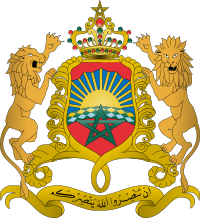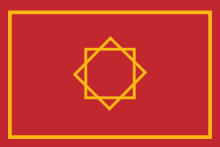Saadi dynasty
| Saadi dynasty of Morocco | ||||||||||||
| السعديون (ar) | ||||||||||||
| Ruling dynasty of Morocco | ||||||||||||
| ||||||||||||
|
| ||||||||||||
Extent of the Saadian empire during the reign of Ahmad al-Mansur[1] | ||||||||||||
| Capital | Marrakech | |||||||||||
| Religion | Sunni Islam | |||||||||||
| Government | 1509–49: Principality 1554–59: Sultanate | |||||||||||
| Sultan | ||||||||||||
| • | 1509–17 | Abu Abdallah, Prince of Tagmadert | ||||||||||
| • | 1544–57 | Mohammed Sheikh, first Sultan (1554) | ||||||||||
| • | 1655–59 | Ahmad al-Abbas, last Sultan | ||||||||||
| History | ||||||||||||
| • | Established | 1549 | ||||||||||
| • | Disestablished | 1659 | ||||||||||
| ||||||||||||
Part of a series on the |
|---|
| History of Morocco |
 |
|
Related topics
|
|
|
The Saadi dynasty or Saadian dynasty (Arabic: سعديون; original name Bani Zaydan) was a dynasty that ruled Morocco from 1549 to 1659.
From 1509 to 1549 they had ruled only in the south of Morocco. While still recognizing the Wattasids as Sultans until 1528, Saadian's growing power led the Wattasids to attack them and, after an indecisive battle, to recognize their rule over southern Morocco[2] through the Treaty of Tadla.
Their reign over Morocco began with the reign of Sultan Mohammed ash-Sheikh in 1554, when he vanquished the last Wattasids at the Battle of Tadla. The Saadian rule ended in 1659 with the end of the reign of Sultan Ahmad el Abbas
Origins
They claimed descent from Muhammad through the line of Ali ibn Abi Talib and Fatima Zahra (Muhammad's daughter). The Saadi came from Tagmadert in the valley of the Draa River. The family's village of origin in the Draa was Tidzi (a qsar, some 10 km north of Zagora).[3] They claimed sharifian origins through an ancestor from Yanbu and rendered Sufism respectable in Morocco. The name Saadi or Saadian derives from "sa'ada" meaning happiness or salvation. Others think it derives from the name Bani Zaydan or that it was given to the Bani Zaydan (shurafa of Tagmadert) by later generations and rivals for power, who tried to deny their Hassanid descent by claiming that they came from the family of Halimah Saadiyya, Muhammad's wet nurse.[4] The most famous sultan of the Saadi was Ahmad al-Mansur (1578–1603), builder of the El Badi Palace in Marrakech and contemporary of Elizabeth I. One of their most important achievements was defeating the Portuguese at the Battle of Ksar El Kebir and defending the country against the Ottomans. Before they conquered Marrakech, they had Taroudannt as their capital city.
The Saadian Tombs were rediscovered in 1917 and can be seen in Marrakech.
Chronology
- 1509: establishment of the Saadian Principality in Tagmadert;
- 1511: the Saadians receive the support of the Souss;
- 1524: the Saadians receive the support of the Hintata tribes, who control Marrakech;
- 1527: the Wattasids recognize the Saadian rule of southern Morocco through the Treaty of Tadla;
- 1541: the saadian army expels the Portuguese from Agadir, Azamor, Azafi and Arzila;
- 1554: Mohammed ash-Sheikh overthrows Ahmad el Abbas, the last wattasid Sultan;
- 1561–67: annexation of the principalities of Tetouan, Chefchaouen and Debdou;
- 1578: Battle of Alcácer Quibir: Moroccan victory over the Portuguese army;
- 1581: conquest of the Touat;
- 1591: battle of Tondibi, conquest of the Songhai Empire;
- 1603–27: civil war after the death of Ahmad al-Mansur, opposing three pretenders: Abou Fares Abdallah, Zidan al-Nasir and Mohammed esh Sheikh el Mamun; beginning of the decline of the Saadi Empire;
- 1628: reunification of Fes and Marrakech, but Saadians didn't retrieve the control over many territories: Rabat, Salé and Tetouan ruled by Andalusis, Tafilalet by the Alaouites, Oujda by the Ottomans and many other territories lost to warlords, Zaouias leaders and refractory tribes; they lost gradually the control over the territories that remained under their rule until 1659, when they disappeared from the Moroccan political and military scenes.
| Caliphate خِلافة |
|---|
|
Main caliphates |
|
Parallel caliphates |
|
|
Rulers
1509–54: Saadian princes of Tagmadert
- Abu Abdallah al-Qaim (1509–17)
- Ahmad al-Araj (1517–44)
- Mohammed ash-Sheikh (1544–54)
1554–1659: Saadian sultans of Morocco
- Mohammed ash-Sheikh (1554–57)
- Abdallah al-Ghalib (1557–74)
- Abu Abdallah Mohammed II (1574–76)
- Abu Marwan Abd al-Malik I (1576–78)
- Ahmad al-Mansur (1578–1603)
1603–27: Succession war
|
Main Saadian rulers, based in Marrakesh:
|
Splinter faction based in Fes, with only local power:
|
1627–59: Reunified rule
- Abu Marwan Abd al-Malik II (r.1627–31)
- Al Walid ibn Zidan (r.1631–36)
- Mohammed esh Sheikh es Seghir (r.1636–55)
- Ahmad el Abbas (r.1655–59)
Timeline

See also
References
- ↑ "Trade and empire in Africa, 1500–1800", Times Books 2007, on qed.princeton.edu
- ↑ H. J. Kissling, Bertold Spuler, N. Barbour, J. S. Trimingham, F. R. C. Bagley, H. Braun, H. Hartel, The Last Great Muslim Empires, BRILL 1997, p.102
- ↑ The Saadian sultan Mohammed esh Sheikh es Seghir wrote in a letter to the a member of the Alaouite family (Moulay Mohammed ould Moulay Cherif ): "We are from Tidsi, one of the qsour of the Draa." (Nozhet el Hadi, p. 15). The geographical position of Tidzi is: Latitude: 30° 59' 52 N, Longitude: 7° 24' 49 W.
- ↑ The use of Analogy and the Role of the Sufi Shaykh in Post-Marinid Morocco, Vincent Cornell, International Journal of Middle East Studies, vol. 15, no. 1 (Feb. 1983), pp. 67–93
Further reading
- Rosander, E. Evers and Westerlund, David (1997). African Islam and Islam in Africa: Encounters Between Sufis and Islamists. C. Hurst & Co. Publishers. ISBN 1-85065-282-1
- S. Cory, Reviving the Islamic Caliphate in Early Modern Morocco, Ashgate Publishing (2014). ISBN 9781472413987
- Morocco in the Sixteenth Century. Problems and Patterns in African Foreign Policy by Dahiru Yahya, Canadian Journal of African Studies / Revue Canadienne des Études Africaines, Vol. 18, No. 1 (1984), pp. 252–253
| — Royal house — House of Banu Zaydan | ||
| Preceded by Wattasid dynasty |
Ruling house of Morocco 1554–1659 |
Succeeded by Alaouite dynasty |

_(1258_1659).svg.png)